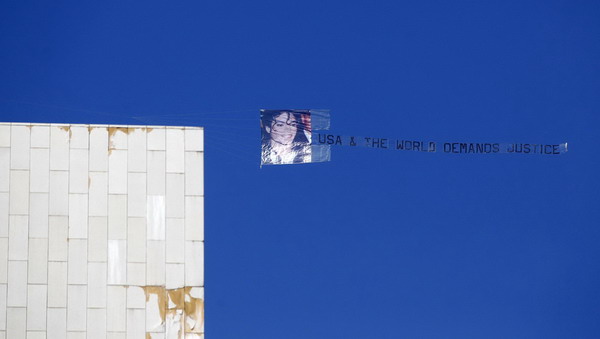Tape, testimony reveal Jackson's hope for comeback
Updated: 2011-09-28 11:14
(Agencies)
|
|||||||||
|
 An airplane (not pictured) tows a banner as it flies over the Los Angeles Superior Court during the opening day of Dr. Conrad Murray's trial in the death of pop star Michael Jackson in Los Angeles Sept 27, 2011. [Photo/Agencies]
|
That intimate portrait of Jackson's aspirations for the series of London concerts came to light on Tuesday in testimony and in a shocking audiotape of Jackson slurring his words that was played on the first day of the trial of Dr Conrad Murray.
The doctor is accused of involuntary manslaughter in the "Thriller" singer's death. He has pleaded not guilty.
The 50-date comeback tour billed as "This Is It" was slated to open at London's O2 arena on July 13, 2009, and when he died of an overdose of propofol and sedatives on June 25 at his rented Los Angeles mansion, Jackson was in the middle of rehearsals.
In one of the most dramatic moments of deputy district attorney David Walgren's opening arguments to the jury, a May 10 audio recording Murray made of Jackson slurring his words was played for jurors.
Jackson speaks slowly and mumbles, sounding incoherent at times, which Walgren said was obviously the singer under the influence of some type of substance.
"We have to be phenomenal, when people leave this show, when people leave my show, I want them to say I've never seen nothing like this in my life," Jackson said on the tape.
The pop star said he wanted people to know he was "the greatest entertainer in the world," and also mentioned using profits from the shows to fund a huge children's hospital.
Jackson's difficulty communicating on the recording showed him at his most vulnerable, and "This Is It" co-director Kenny Ortega at times amplified that depiction in his testimony.
Ortega in an email to the head of AEG Live - the company behind "This Is It" - expressed concern about how Jackson would react if, as a result of his failure to properly prepare for the shows in rehearsals, the tour was canceled.
"It would shatter him, break his heart, if we pulled the plug," Ortega said in the email.
There was also evidence of Jackson's broad aspirations for the tour. Ortega testified that if the 50 shows were successful, there were plans to take the tour to other countries beyond Great Britain and possibly even to the United States.
Ed Chernoff, the lead attorney for Murray, said in his opening arguments that the potential windfall if Jackson could have resurrected his career with "This Is It" would have amounted to hundreds of millions of dollars. That would have been a dramatic reversal of fortune for Jackson, who at the time faced a mountain of debt.










